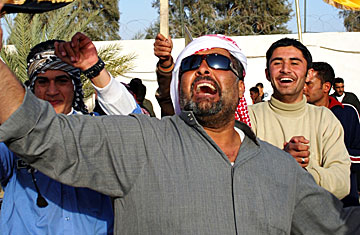
Sunni Muslim Iraqis and members of Sons of Iraq celebrate following yesterday's provincial elections in Ramadi, Anbar Province.
For about four days, the most powerful armed factions in Iraq were girding for war. Fighting tribesmen from Anbar province were openly threatening violence against political rivals they accused of trying to steal the provincial elections by stuffing ballot boxes in the Jan. 31 vote. Iraqi security forces in Anbar braced for trouble, at one point imposing a curfew, an increasingly rare move these days. U.S. forces in the province watched the situation warily, wondering whether the relative calm Iraq has known for roughly the last year would unravel in a matter of days or even hours. "The levels of violence can spike out of — almost out of control," said Lt. Gen. Lloyd Austin, the U.S. ground commander in Iraq. "We have to be mindful of that."
Nevertheless, the tribesmen of the Awakening movement — Sunni fighters who joined forces with U.S. troops to battle insurgents in 2007 — cooled down after preliminary election results showed them in second place — but well ahead of the alleged offending party. "The results are for us acceptable," said Hekmat Salman al-Ayida, a candidate for the provincial council for Anbar running under the Awakening movement's banner. The tense days, however, showed that armed retaliation for purported wrongs, remains an option for many Iraqis. The prospect of war still hovers over the country, despite the significant drop in violence. (See pictures of U.S. troops' 5 years in Iraq.)
The weekend brought further reminders of the bloody rifts that still crisscross the country. On Saturday, the top official in the semi-autonomous Kurdish region of northern Iraq voiced anger over what he described as provocative troop movements by the central government around Kirkuk, the disputed oil-rich city. The Associated Press reported that the Kurdish prime minister, Nechirvan Barzani, denounced a move by Iraqi Prime Minister Nouri al-Maliki to deploy Iraqi soldiers ahead of the provincial balloting on the outskirts of Kirkuk, which both the Iraqi central government and Kurdistan regional authorities claim. The Iraqi government denied the accusation, saying its movements in the area were routine. Then on Sunday Shi'ite worshippers beginning annual pilgrimages on foot from Baghdad toward Karbala came under attack. A roadside bomb killed two and wounded 11 in the latest sign that sectarian bloodshed is still a regular occurrence.
Speaking to reporters in Baghdad, General Austin said the northern city of Mosul and the eastern province of Diyala remained trouble spots where Sunni militants continued to wage an insurgency despite the best efforts by U.S. and Iraqi forces to stamp out the rebellion. "They still have some capability," Austin said of Sunni militants still actively organizing in parts of Iraq. "We are still working to degrade the network."
For many Iraqis, the war continues as part of everyday life, regardless of the ebb and flow of political tensions around the country at any given time. Violent acts by either Sunni militants or Shi'ite militiamen come almost every day in Iraq. U.S. military officials say violent incidents in Iraq have been slightly below 100 per week for the past 10 weeks and regard the trend as a sign of success. But that level of violence is more than enough to keep most people on edge. "From what we see on a daily basis, the war is still going on," says Salim Kamel Shawal, who runs a wholesale women's underwear shop in northern Baghdad. "The war will be over when Baghdad is stable, whenever that is." With reporting by Tariq Anmar/Baghdad
